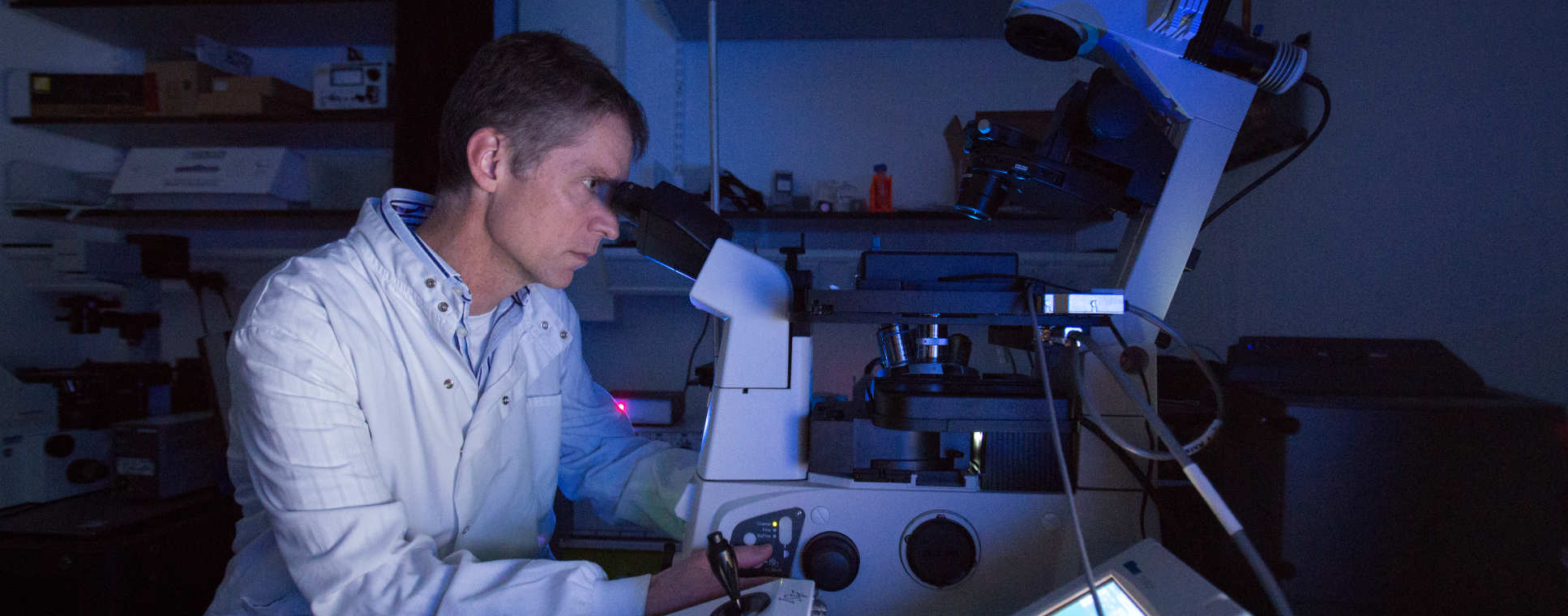Islet Cell Biology: birth, identity and death

We aim to understand how the human beta cell achieves and maintains functional maturity and what goes wrong in type 2 diabetes. Our key focus areas include:
- Beta cell identity and loss in disease: plasticity, heterogeneity, cell-cell communication, dedifferentiation, reversal (Rutter, Ferrer)
- Epigenetics - chromatin marks, super-enhanced enhancers, non-coding RNAs, disallowed genes (Rutter, Ferrer, Latreille)
- Cellular signalling: mechanisms of nutrient sensing, electrical activity, circadian rhythms, gluco- and lipotoxicity (Rutter, Leclerc, Carling)
- Modelling genetic variants: Genome editing, directed differentiation, mouse genetics, lower organisms (Rutter, da Silva Xavier, Withers)
- Protecting beta cells: incretins, adipokines (Salem, Tomas, Rutter, Bloom, Gardiner)
- Roles of islet non-beta cells in glucose homoeostasis and diabetes risk (Rutter, da Silva Xavier)
Theme leads
Professor Guy Rutter, Head of Section of Cell Biology and Functional Genomics in the Department of Medicine, leads this theme. He is interested in signal transduction in the pancreatic beta cell, its regulation by genetic and environmental cues, and failure in type 2 diabetes. Further information on Professor Rutter
Contributors
Professor Guy Rutter
/prod01/channel_2/media/migration/faculty-of-medicine/G-Rutter--tojpeg_1460040826721_x4-4.jpg)
Professor Guy Rutter
Head of Cell Biology and Functional Genomics
Professor Dominic Withers
/prod01/channel_2/media/migration/faculty-of-medicine/Withers,-Dominic--tojpeg_1470218369524_x4-2.jpg)
Professor Dominic Withers
Clinical Chair in Diabetes and Endocrinology
Professor Per-Olof Berggren
/prod01/channel_2/media/migration/faculty-of-medicine/Berggren,-Per-Olof--tojpeg_1470215852342_x4-1.jpg)
Professor Per-Olof Berggren
Professor of Experimental Endocrinology
Professor David Carling
/prod01/channel_2/media/migration/faculty-of-medicine/Carling,-David--tojpeg_1470215720478_x4-1.jpg)
Professor David Carling
Professor of Biochemistry
Professor Jorge Ferrer
/prod01/channel_2/media/migration/faculty-of-medicine/Ferrer,-Jorge--tojpeg_1470213071491_x4-2.jpg)
Professor Jorge Ferrer
Chair in Medicine and Genetics
Dr Mathieu Latreille
/prod01/channel_2/media/migration/faculty-of-medicine/Latreille,-Mathieu--tojpeg_1470216681056_x4.jpg)
Dr Mathieu Latreille
Cellular identity and metabolism
Dr Isabelle Leclerc
/prod01/channel_2/media/migration/faculty-of-medicine/Isabelle-Leclerc--tojpeg_1460040779301_x4-1.jpg)
Dr Isabelle Leclerc
Clinical Senior Lecturer in Diabetes and Endocrinology
Dr Aida Martinez Sanchez
/prod01/channel_2/media/migration/faculty-of-medicine/Sanchez,-Aida--tojpeg_1499078170493_x4.jpg)
Dr Aida Martinez Sanchez
Research Associate
Dr Timothy Pullen
/prod01/channel_2/media/migration/faculty-of-medicine/Timothy-Pullen--tojpeg_1460040906362_x4-1.jpg)
Dr Timothy Pullen
Research Associate
Dr Alejandra Tomas
/prod01/channel_2/media/migration/faculty-of-medicine/Tomas,-Alejandra--tojpeg_1476790350955_x4-1.jpg)
Dr Alejandra Tomas
Early Career Researcher
Dr Gabriela Da Silva Xavier
/prod01/channel_2/media/migration/faculty-of-medicine/Gabriela-Da-Silve-Xavier--tojpeg_1460041037656_x4-1.jpg)
Dr Gabriela Da Silva Xavier
Non-clinical Lecturer in Cell Biology


